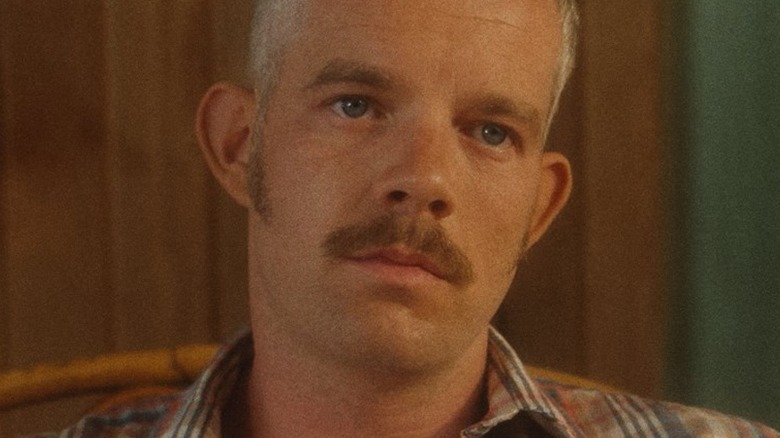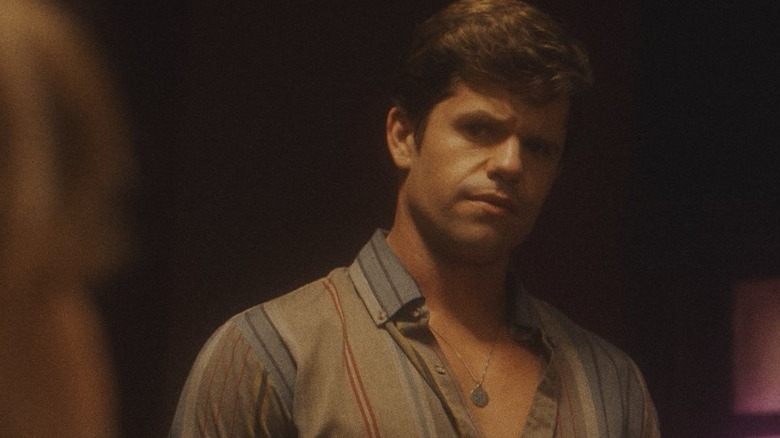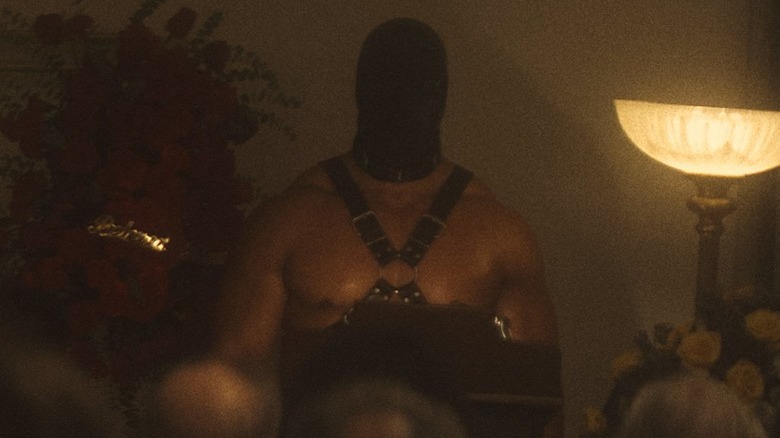The Real-World Symbolism In The AHS: NYC Finale Explained
Contains spoilers for the finale of "American Horror Story: NYC"
Before its premiere in late October 2022, the secrets surrounding "American Horror Story's" 11th season were reaching a fever pitch. Unlike previous installments of the horror anthology series, what would become "AHS: NYC" didn't benefit from a build-up thanks to numerous promo trailers, cast interviews, sneak peeks, or the like. For what would eventually become a killer-on-the-loose story set in the Big Apple of the early 1980s, the installment primarily revolved around gay men being stalked, much like the Al Pacino-led movie "Cruising" from 1980. By the time the finale "Requiem 1981/1987 Parts 1 and 2" aired, the show had become so much more.
Despite the new installment's grittier and more real-world atmosphere, some fans feel that Season 11 is much different from previous seasons. While serial killer or slasher stories are certainly within the horror genre, "AHS: NYC" always looked at the horrors of reality throughout its nine-episode run. There is perhaps no finer example of this approach than in the season finale, which tied up the loose ends of the season without revealing who or even what antagonist Big Daddy (Matthew William Bishop) is (per TVLine). But the villain's probable identity is tied to the real-world symbolism the last episode provided in abundance.
AHS: NYC contained powerful symbolism and imagery surrounding the AIDS virus in the 1980s
"American Horror Story: NYC" opened in 1981, which is also the year that HIV/AIDS was first reported. Although this installment of the show revolved around a mysterious murderer of gay men known as "Big Daddy," the final episode completely upended the traditional ending of an "AHS" story by exploring the eventual fates of many of the main characters six years in the future of 1987. By the first year of the late '80s, the AIDS virus had become a worldwide epidemic, with around 80 people per week dying of the ailment in that year alone. Throughout the installment, Dr. Hannah Wells (Billie Lourd) was featured as a scientist working on understanding a mysterious new virus.
On the series' subreddit page discussing the symbolism of the epidemic in the show and general plot confusion, Redditor, u/ScriptorMalum highlighted the odd symptoms characters came down with and shared, "I feel like it's a reference to how they called most of those early deaths anything before they could identify it as AIDS..." The viewer then pointed out the early inconsistencies in the virus. This was followed by another fan, u/solamismile, agreeing with the theory by stating, "Like many others have said, the illness could be AIDS or some mystery virus that is the 'stand in' for AIDS in the AHS universe..." The Redditor then focused on the symbolism of the infected deer that appears in imagery throughout the season.
Fans point to AHS: NYC's villain Big Daddy being a metaphor for the virus
The finale of "AHS: NYC" did not specifically resolve the unanswered questions behind the leather-clad muscleman "Big Daddy." But some clues allude to the season antagonist being a metaphor for HIV/AIDS or even an Angel of Death of sorts (via Digital Spy). In an interview with ET Online, Leslie Grossman (Barbara Read) pointed out the installment's ambiguity by commenting, "This is a season that, in my opinion, deserves two watches." The actress then shared, "There's gonna be things that maybe didn't resonate when you first saw it, that when it's all done, the complete story will be very interesting to see from a different angle of knowing what you know."
Before the final episode aired, fans were already calling Big Daddy a metaphor for AIDS. On the program's subreddit page, in a post discussing Big Daddy as a metaphor for the sickness, u/BlancoDelRio shared a dislike about the theory by saying, "Would really hope they didn't make AIDS a spooky leatherman serial killer but that will probably be it." Others were more open to the idea, with u/Acceptable-Cobbler53 adding, "I definitely don't think he's alive that's for sure. I've been thinking he's a ghost but the embodiment of HIV seems to make sense. Now you have me really thinking." If this is the correct interpretation, the 11th season of "American Horror Story" is indeed a different level of frightening.


